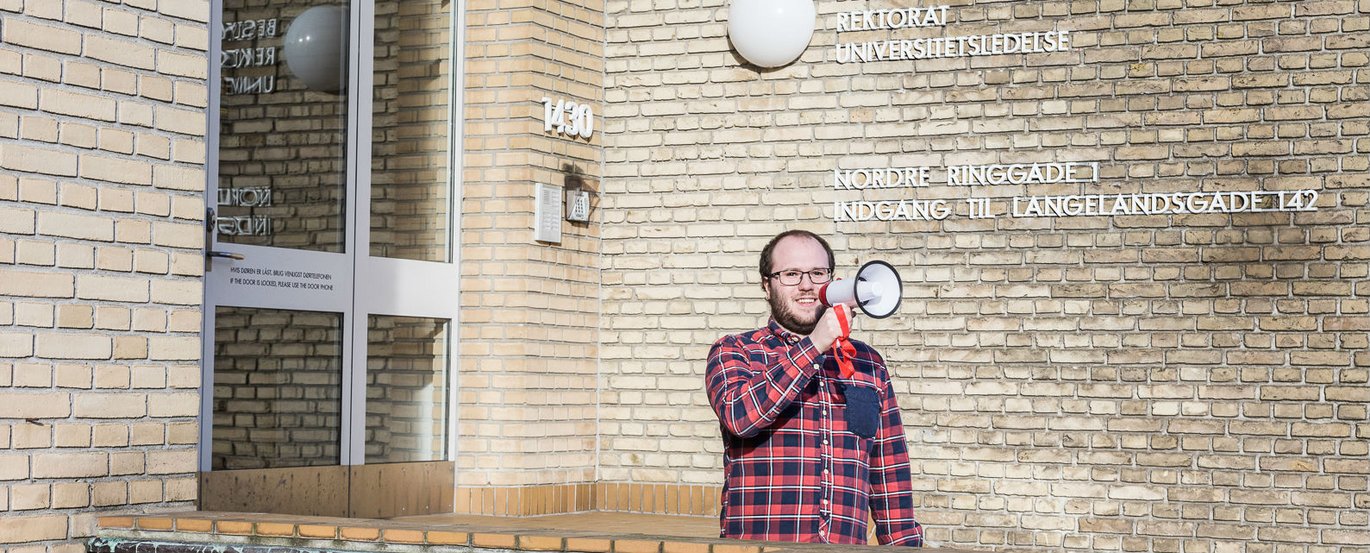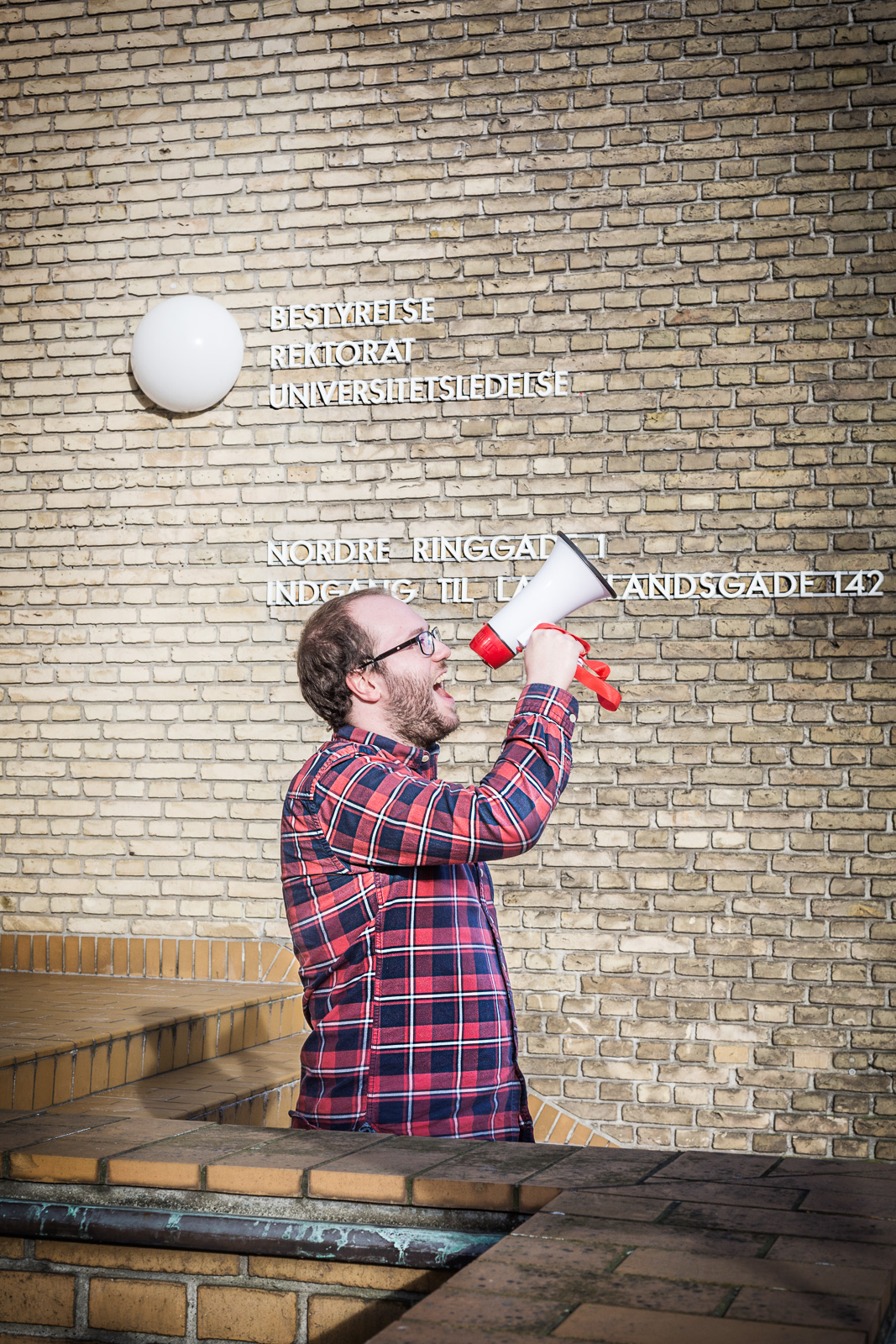New chairman: Universities are not educational factories
Political Science student Mads Hareskov has just been elected the new chair of the Student Council at Aarhus University. His first big job is to help ensure that the study progress reform is implemented as leniently as possible at AU.


Mads Hareskov takes up the position of chair of the Student Council at a time when AU is under financial pressure due to cutbacks and reforms.
"You could call it an exciting time if you wanted to put a positive spin on it," says Hareskov, before explaining that the study progress reform is the direct reason why he got involved in student politics in earnest.
"The study progress reform affects the students' everyday lives and education. I felt I had to do something to help show that we weren’t going to put up with it. I also have a general attitude that says you should get involved there where you are," says Hareskov, who joined the Student Council's executive committee a year ago.
"In the world of student politics that’s a pretty fast career. But there’s a high turnover, so you can quickly become one of the old timers," he says with a laugh.
Not too rigid
He is currently engaged in a dialogue with AU's management on the implementation of the study progress reform at AU following the political adjustments that were made to the reform last autumn.
"What’s new is that they’ve now left it up to the universities to find out what needs to be done to reduce the students’ time to degree. That gives us as students better opportunities to play a role and we’re trying to help find a good solution together with the management."
The university is under pressure as it is facing the prospect of a financial penalty if it does not succeed in reducing the average time to degree. So even though Hareskov and the rest of the student council dream of going back to the good old days before the study progress reform, and at national level also fight against the reform and cutbacks in the field of education, they have chosen to participate constructively in the work of implementing the reform as leniently as possible at AU.
Facts: Mads Hareskov
- 24-year-old eighth semester political science student
- In recent years a member of the Student Council's Executive Committee.
- Originally from Ringkøbing, took the social science track in upper secondary school and moved to Aarhus in 2012 to study political science. Like many other political science students, he cannot deny that he too has dreams of changing the world – though not necessarily by sitting in the Danish parliament. Mads Hareskov can see himself working for a special interest organisation.
"We want to be involved in forming future rules and regulations, but it must be done so that we ensure that active enrolment requirements don’t become so rigid that you could, for example, risk failing your degree programme just by failing an individual course. That’s a real risk with major subjects that provide many CTS credits or with Master’s thesis that are worth 60 ECTS credits. But a single course must never mean make or break for a student," he says.
Why only the stick?
The Student Council is therefore working to ensure there is a good practice for dispensations among the boards of studies. They also encourage the university management to use the carrot rather than the stick in their attempts to get the students to complete their degree programmes within the stipulated time of study.
"You can do that by making sure there’s proper student guidance, creating a better study environment, ensuring adequate teaching and feedback, encouraging the use of study groups and by generally ensuring that the students are equipped to take their exams."
Educational factories
Even though Hareskov has decided to take a constructive approach towards the implementation of the study progress reform, he still finds it difficulty to accept the view of education which he believes the reform is an exponent of. One where educational institutions are reduced to factories that spit out products in the form of students who are pre-programmed to fill a specific slot in the labour market.
"This production mentality and the factory analogy are wrong and an unfortunate way of viewing education and students. That’s because it thereby reduces education to a process that can be optimised and cutback to precisely what’s necessary."
This is, of course, a convenient way of thinking for politicians to promote when they want to make cuts in the area of education and research, in much the same way as it is convenient to call the students lazy and the universities overfed, says the chair of the Student Council.
He subscribes to the perception of education as a social good where people are educated and formed so they can attain a higher level of knowledge, rather than a specific function in society.
"We invest a lot of money in education and it’s a good investment because we really get a lot for our investment in the form of new knowledge, new insight and critical thinking. I believe much of our wealth in Denmark is connected to the fact that we educate people. We’re not a country which is rich in natural resources, so a well-educated population is one of our biggest resources. That’s also why we must create the best possible framework for our students and our degree programmes."
Mads Hareskov replaces Sune Koch Rønnow, who has been chair of the Student Council since 2014.
About the new chair of the Student Council:
The last time my blood pressure went through the roof was: … last week, when I read a syllabus text where the author's political project was very clear, including an argument for why inequality is not a problem. That doesn’t harmonise at all well with my own position, so I had to take some breaks while reading the text.
Very few people know that I: … am pretty good at skiing, as I’m not a particularly sporty person otherwise. After upper secondary school I took two years off and spent two seasons working at a ski resort in northern Norway. I really need to go skiing every year or I'll start suffering from withdrawal symptoms.
I can't imagine anything better than when I: … have spent a long time working on a big project, for example in the Student Council, and it’s a success and all the hard work comes together and makes sense. That’s how I felt about working on the Uddannelsesalliancen, where we fought against the educational cutbacks.
My favourite apps: I use Rejseplanen a lot (travel app, ed.). And then I think that Jordel is quite fun. It’s an app that is especially popular on American campuses that lets you share small anonymous messages with other Jordel users within a radius of about 1ten kilometres. People are more unrestrained because it’s anonymous, but at the same time, it’s quite intimate because you know they’re close by.
My favourite place at AU: The lawn by the lake in the University Park, more precisely the corner facing towards Political Science - I think it’s known as Jurabakken. It’s a nice place to sit on a sunny day between two lectures.

